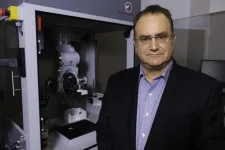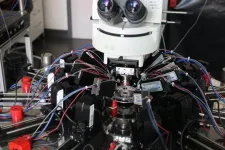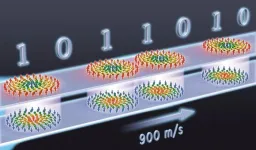(Press-News.org) Three scientists from the Department of Energy’s Oak Ridge National Laboratory have been elected fellows of the American Association for the Advancement of Science, or AAAS, the world’s largest general scientific society and publisher of the Science family of journals.
"Keith Kline, Rigoberto Advincula and Takeshi Egami have delivered significant impact for the scientific community," said ORNL Director Stephen Streiffer. "This distinguished honor highlights their commitment, hard work and leadership in their respective fields. I offer my congratulations to them on this well-deserved recognition.”
AAAS Fellows are a distinguished cadre of scientists, engineers and innovators who have been recognized for their achievements across disciplines ranging from research, teaching and technology, to administration in academia, industry and government, to excellence in communicating and interpreting science to the public. The AAAS Fellows program is celebrating its 150th anniversary, welcoming 502 scientists and engineers to the 2023 class.
ORNL’s new AAAS fellows include:
Keith Kline, distinguished scientist in the Environmental Sciences Division
Kline was recognized by the AAAS section on Societal Impacts of Science and Engineering “for distinction in promoting evidence-based research and stakeholder engagement to improve natural resource management around the globe.”
Kline is recognized as an international leader applying scientific methods to measure performance toward sustainable development goals, including circular, inclusive and climate-smart economies. His work has focused on community-led natural resource management, which engages stakeholders in setting priorities and developing evidence-based, practical approaches to improve management of water, land and human resources. Kline also spent 24 years on intermittent assignments living and working in developing nations in support of U.S. Agency for International Development programs.
Kline serves as the Just Transitions lead for the multi-agency Net Zero World Initiative, is a perennial co-author of the DOE Billion-Ton Report series focusing on the sustainability of potential U.S. biomass resources, and collaborates with the U.S. Environmental Protection Agency to assess global effects of biofuel policies as coauthor of the Triennial Report to Congress on the U.S. Renewable Fuel Standard. He also leads the Sustainability Workstream for the Clean Energy Ministerial Biofuture Platform, a multi-stakeholder initiative promoting international coordination to advance a sustainable, renewable carbon bioeconomy. His work has supported the DOE Bioenergy Technologies Office and international standard and certification programs to establish practical indicators, targets, baselines and best practices for stakeholder engagement associated with improving the sustainability of biomass production.
Rigoberto Advincula, leader of the Macromolecular Nanomaterials group
Advincula was recognized by the AAAS section on Engineering for his “distinguished contributions in the field of polymer science, particularly in interfacial chemistry, characterization and synthesis of hybrid macromolecular architectures and applications.”
Advincula is a UT-ORNL Governor's Chair and leads ORNL’s Macromolecular Nanomaterials group in the Center for Nanophase Materials Science. His areas of research include utilizing the structure and functionalities of materials on a near-atomic scale, characterizing and developing new materials sensors, optics, biotechnology, biomedicine, energy production and advanced manufacturing.
Advincula received his doctorate in chemistry from the University of Florida. He did post-doctoral work at Stanford University and the Max Planck Institute for Polymer Research in Germany. He earned his bachelor’s degree in chemistry from the University of the Philippines.
He came to ORNL in 2020 as a joint faculty member at UT and ORNL and was appointed as a Governor’s Chair. Advincula was elected as a Fellow of the Royal Society of Chemistry, the oldest official group devoted to chemistry, the American Chemical Society, the Polymer Science and Engineering Division, the Polymer Chemistry Division, and the National Academy of Inventors.
Takeshi Egami, UT-ORNL distinguished scientist in the Physical Science Directorate
Egami was recognized by the AAAS section on Physics for his “distinguished contributions to condensed matter physics and materials science, particularly for pioneering uses of neutron and synchrotron X-ray scattering techniques to analyze local atomic correlations in complex systems.”
The complex systems that he explores include glasses, liquids, and electronic oxides, such as high-temperature superconductors.
Egami received his bachelor’s degree in applied physics from the University of Tokyo in 1968, and his doctorate in materials science from the University of Pennsylvania in 1971. After the postdoctoral research at the University of Sussex, U.K. and Max-Planck-Institute in Stuttgart, Germany, he returned to the University of Pennsylvania in 1973 as Assistant Professor. He was promoted to Associate Professor in 1976, to Professor in 1980, and was the Chair of the Department of Materials Science and Engineering from 1997 to 2002. He moved to the current position in 2003. He was the director of University of Tennessee-ORNL Joint Institute for Neutron Sciences from 2008-2015.
AAAS is the world’s largest general scientific society and publisher of the journal Science, as well as Science Translational Medicine; Science Signaling; a digital, open-access journal, Science Advances; Science Immunology; and Science Robotics. AAAS was founded in 1848 and includes more than 250 affiliated societies and academies of science.
UT-Battelle manages ORNL for the Department of Energy’s Office of Science, the single largest supporter of basic research in the physical sciences in the United States. The Office of Science is working to address some of the most pressing challenges of our time. For more information, please visit energy.gov/science.
END
Three ORNL scientists elected AAAS Fellows
2024-04-18
ELSE PRESS RELEASES FROM THIS DATE:
Rice bioengineers win $1.4 million ARPA-H grant for osteoarthritis research
2024-04-18
HOUSTON – (April 18, 2024) – Bioengineers at Rice University have been awarded $1.4 million as part of a multi-center consortium funded by the Advanced Research Projects Agency for Health (ARPA-H) to develop strategies for reversing the effects of osteoarthritis.
“We’re thrilled to be a part of this collaborative effort to tackle one of the most challenging degenerative joint diseases and develop, test and commercialize solutions for patients,” said Antonios Mikos, the Louis Calder Professor of Chemical Engineering and professor of bioengineering ...
COVID-19 booster immunity lasts much longer than primary series alone, York University-led study shows
2024-04-18
April 18, 2024, TORONTO – Thinking about getting a spring-time booster shot? A new study coming out of York University’s Centre for Disease Modelling in the Faculty of Science shows that immunity after a COVID-19 booster lasts much longer than the primary series alone. These findings are among other, sometimes “unintuitive,” revelations of how factors like age, sex and comorbidities do and don’t affect immune response.
The study’s authors – York Post Doctoral researchers Chapin ...
Bentham Science joins United2Act
2024-04-18
Bentham Science Publishers is now a signatory organization of United2Act's consensus statement on paper mills.
We are committed to upholding the highest standards of research integrity in academic and scientific publishing. Part of the effort to uphold integrity in scientific publishing includes preventing publication from fraudulent 'paper mills' which negatively impact the credibility of research. We fully support the COPE position statement on this critical issue.
The intrusion of fraudulent papers into the publication record not only undermines public trust in research but also poses significant risks to ...
When thoughts flow in one direction
2024-04-18
Contrary to previous assumptions, nerve cells in the human neocortex are wired differently than in mice. Those are the findings of a new study conducted by Charité – Universitätsmedizin Berlin and published in the journal Science.* The study found that human neurons communicate in one direction, while in mice, signals tend to flow in loops. This increases the efficiency and capacity of the human brain to process information. These discoveries could further the development of artificial neural networks.
The neocortex, a critical structure for human intelligence, is less than five millimeters thick. There, in the outermost layer of the brain, 20 billion neurons process ...
Scientists identify airway cells that sense aspirated water and acid reflux
2024-04-18
Scientists Identify Airway Cells That Sense Aspirated Water and Acid Reflux
The new work by UCSF researchers could lead to interventions to prevent pneumonia or treat certain types of chronic cough.
When a mouthful of water goes down the wrong pipe – heading toward a healthy person’s lungs instead of their gut – they start coughing uncontrollably. That’s because their upper airway senses the water and quickly signals the brain. The same coughing reflex is set off in people with acid reflux, when acid from the stomach reaches the throat.
Now, UC San Francisco scientists have identified the rare type of cell responsible ...
China’s major cities show considerable subsidence from human activities
2024-04-18
The land under nearly half of China’s major cities is undergoing moderate to severe subsidence, affecting roughly one-third of the nation’s urban population, according to a systematic national-scale satellite assessment. The findings suggest that within the next century, 22 to 26% of China’s coastal land will have a relative elevation lower than sea level, putting hundreds of millions of people at elevated risk of flooding due to sea-level rise. Over the last several decades, China has experienced one of the most rapid and extensive urban expansions in human history. This massive wave of urbanization may be threatened ...
Drugs of abuse alter neuronal signaling to reprioritize use over innate needs
2024-04-18
Drugs of abuse, like cocaine and opioids, alter neuronal signaling in the nucleus accumbens (NAc), hijacking a key brain reward system involved with the fulfillment of innate needs for survival, according to a new study in mice. The findings provide mechanistic insights into the intensification of drug-seeking behaviors in substance use disorders. Persistent drug use is accompanied by a profound reprioritization of motivations, skewing decision-making behaviors toward a myopic focus on drug use over other innate needs, like eating or drinking water, often ...
Mess is best: disordered structure of battery-like devices improves performance
2024-04-18
The energy density of supercapacitors – battery-like devices that can charge in seconds or a few minutes – can be improved by increasing the ‘messiness’ of their internal structure.
Researchers led by the University of Cambridge used experimental and computer modelling techniques to study the porous carbon electrodes used in supercapacitors. They found that electrodes with a more disordered chemical structure stored far more energy than electrodes with a highly ordered structure.
Supercapacitors are a key technology for the energy transition and could be useful for certain forms of public transport, as well as for ...
Skyrmions move at record speeds: a step towards the computing of the future
2024-04-18
An international research team led by scientists from the CNRS1 has discovered that the magnetic nanobubbles2 known as skyrmions can be moved by electrical currents, attaining record speeds up to 900 m/s.
Anticipated as future bits in computer memory, these nanobubbles offer enhanced avenues for information processing in electronic devices. Their tiny size3 provides great computing and information storage capacity, as well as low energy consumption.
Until now, these nanobubbles moved no faster than 100 m/s, which is too slow for computing applications. ...
A third of China’s urban population at risk of city sinking, new satellite data shows
2024-04-18
Land subsidence is overlooked as a hazard in cities, according to scientists from the University of East Anglia (UEA) and Virginia Tech.
Writing in the journal Science, Prof Robert Nicholls of the Tyndall Centre for Climate Change Research at UEA and Prof Manoochehr Shirzaei of Virginia Tech and United Nations University for Water, Environment and Health, Ontario, highlight the importance of a new research paper analysing satellite data that accurately and consistently maps land movement across China.
While they say in their comment article that consistently measuring subsidence is a great achievement, they argue it is only the start of finding solutions. Predicting ...






